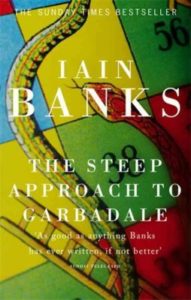I particularly liked that although most of the story is told from Alban’s point of view, he is described at first from the outside, first from his cousin Fielding’s perspective, then from that of Tango, the man he is staying with in Perth. It immediately creates the sense of Alban as a slightly mysterious, unknowable character, and this feeling persists through the rest of the book, even as we are told much more about him and given access to his thoughts. It’s a clever device, and the book is full of similar effects. If the clues to the ending had been a little less heavy-handed, this would have been an excellent book.
A book about resistance to change. It starts with everything stuck: the Wopulds still owners of the family board-game business as they have been for a century, Alban still obsessed with his childhood love for his cousin Sophie, still stuck in self-destructive rebellion, and his mother’s suicide when he was two years old still a mystery.
As the book progresses, things slowly begin to change, even though most of the characters fight to keep things the way they are. An American company bids to take over the company, and Alban makes discoveries about his mother. The clues to the resolution of the family issues were, for me, a little too obvious, so that about halfway through I guessed more or less what would happen. But still the ending was well handled and satisfying.
In any case, I don’t want to give away the resolution of these issues, but the way Iain Banks resolves the more political side is interesting and can be described without giving away too much. Alban has rejected his family and everything they stand for (the board game they’re famous for is called “Empire!” and they’ve partly sold out already to the US company, which Alban associates with US policies of war, extreme capitalism and globalisation). He ‘cuts off his nose to spite his face’ – he is homeless in a Perth council estate, having worked as a forester where he cut off his own finger (accidentally) with a chainsaw. At the end he goes on a walk near Garbadale and, while on the mountaintop, realises that “Some hopes and ambitions were mainfest only as a direction, not as a destination. Maybe the trick was to realise you were involved in a process, not aiming at a completely achievable end result, and accept that, but travel hopefully anyway.”
The narrative jumps around abruptly between times and places, progressing in the “present” while also weaving in episodes from Alban’s childhood and early adulthood. There’s usually no pretence of a reason for the flashback, such as a character remembering – it’s just done abruptly, like a cinematic jump cut. Mostly it works, although a couple of times the tenses seem confused – can’t find the examples now, of course!
I particularly liked that although most of the story is told from Alban’s point of view, he is described at first from the outside, first from his cousin Fielding’s perspective, then from that of Tango, the man he is staying with in Perth. It immediately creates the sense of Alban as a slightly mysterious, unknowable character, and this feeling persists through the rest of the book, even as we are told much more about him and given access to his thoughts. It’s a clever device, and the book is full of similar effects. If the clues to the ending had been a little less heavy-handed, this would have been an excellent book.



